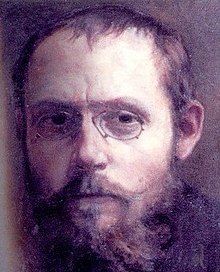Charles Péguy
Charles Pierre Péguy (born January 7, 1873 in Orléans , † September 5, 1914 at Villeroy ) was a French writer .
Life
Peguy was born the son of a carpenter and a chair maker. Since the father Désiré died early, the boy grew up with his mother and grandmother, an illiterate farmer. First he attended elementary school in Orléans, then as a scholarship holder the local grammar school and finally the Lycée Lakanal in Sceaux . He graduated from high school with very good success, in November 1892 he began his military service in Orléans. Since he was a half-orphan, this was limited to one year. After a "License" in philosophy acquired in July 1894, Péguy passed the entrance exam for the École normal supérieure on the third attempt , which he left in August 1898 after failing the Agrégation . Péguy then gave up a university career and became a bookseller and writer.
In 1895 he became a member of the Socialist Party . In 1897 his first drama Jeanne d'Arc appeared under a pseudonym . He founded the bookstore Librairie Georges Bellais with friends in Paris . In the Dreyfus affair , he joined the criticism formulated by Émile Zola in J'accuse . In 1899 he resigned from the Socialist Party. The gap between rich and poor was now considered insurmountable, not even through aspirations for advancement. He himself took it with the "people", one of the key terms of his thinking and writing: "Get rid of the upholstered armchairs, a wooden stool under your bum!"
In 1906 Péguy turned back to Catholicism. As a result, nationalist tones also became clearer in his work.
In 1914 Péguy fell as a lieutenant in the reserve in the French infantry regiment No. 276 by an enemy head shot shortly before the start of the Battle of the Marne . He is buried in the military cemetery in Chauconin-Neufmontiers .
The work of Charles Péguy, especially his critique of the ideology of progress, has recently been read by French philosophers, sociologists and writers with renewed attention, including Alain Badiou , Alain Finkielkraut and Bruno Latour .
Works
- Joan of Arc. 1897
- Notre patrie. 1905
- Clio. Dialogue de l'histoire et de l'âme païenne. 1909
- The mystère de la charité de Joan of Arc. 1910
- Victor-Marie, Comte Hugo. Solvuntur objecta. 1910
- Notre jeunesse. 1910
- Le porche du mystère de la deuxième vertu. 1911
-
Le mystère des Saints Innocents. 1912.
- Oratorio , setting by Henry Barraud ; for orchestra, baritone, recitative, 1946
-
L'argent, L'argent suite. 1913
- The money. Translated by Alexander Pschera . Matthes & Seitz, Berlin 2017 ISBN 3-95757-317-3
- Ève . 1913
literature
- Ernst Robert Curtius : Charles Péguy, in The literary trailblazers of the new France. Kiepenheuer, Potsdam 1919
- in the web archive , Lemma Péguy in the BBKL
- Henri Guillemin : Charles Péguy. Paris 1981
- Joseph Hanimann: The untimely. Charles Péguy: rebel against the rule of the new. Hanser, Munich 2017 ISBN 978-3-446-25610-1
- Jorge Molinas Lara: Crisis and commitment: Political ethics on Charles Péguy. University of Valencia , 2014
- Hella Tiedemann-Bartels: Managed Tradition. Charles Péguy's criticism. Alber, Freiburg 1986 ISBN 3-495-47600-8
Web links
- Literature by and about Charles Péguy in the catalog of the German National Library
- Works by and about Charles Péguy in the German Digital Library
- Center Charles Péguy (French)
- Michael Stallknecht: To be free does not mean to be modernist. NZZ , June 3, 2017
- Hans Conrad Zander : 07.01.1873 - birthday of Charles Péguy WDR ZeitZeichen from January 7th 2018 (podcast)
Individual evidence
- ↑ Elke Lindhorst: The dialectic of intellectual history and theology in modern French literature. Poetry in the tradition of the “Renouveau Catholique” from 1890–1990. Königshausen & Neumann , Würzburg 1995 ISBN 3-8260-1020-5 , p. 24ff.
- ↑ Joseph Hanimann: The crusader of St. Johanna. Rediscovered on the 100th anniversary of his death: Charles Péguy . Süddeutsche Zeitung , September 5, 2014, p. 14.
- ↑ Joseph Hanimann: The crusader of St. Johanna. Rediscovered on the 100th anniversary of his death: Charles Péguy . Süddeutsche Zeitung, September 5, 2014, p. 14.
| personal data | |
|---|---|
| SURNAME | Péguy, Charles |
| ALTERNATIVE NAMES | Péguy, Charles Pierre (full name) |
| BRIEF DESCRIPTION | French author |
| DATE OF BIRTH | January 7, 1873 |
| PLACE OF BIRTH | Orleans |
| DATE OF DEATH | September 5, 1914 |
| Place of death | near Villeroy (Seine-et-Marne) |

